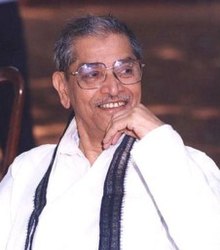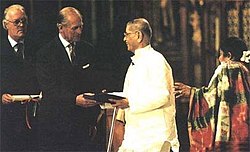Pandurang Shastri Athavale
Pandurang Shastri Athavale | |
|---|---|
 | |
| Born | 19 October 1920 |
| Died | 25 October 2003 (aged 83) Mumbai, Maharashtra, India |
| Other names | Dadaji[1] |
| Known for | Swadhyaya Parivar, activist philosopher, spiritual teacher, spiritual leader |
| Spouse | Nirmala Tai Athavale |
| Children | Jayshree Talwalkar (Dhanashree Shreenivas Talwalkar) |
| Awards |
|
Pandurang Shastri Athavale (19 October 1920 – 25 October 2003), also known as Dada /Dadaji ("elder brother"), was an Indian activist, philosopher, spiritual leader, social revolutionary,[2] and religion reformist, who founded the Swadhyaya Parivar (Swadhyaya family) in 1954.[3] Swadhyaya is a self-study process based on the Bhagavad Gita which has spread across nearly 100,000 villages in India,[4][5] Americas, Europe, Middle East, Oceania and other Asian countries with five million adherents.[6] Noted for his discourses on the Bhagavad Gita, the Vedas and the Upanishads, Dadaji is also known for his selfless work and brilliant knowledge in scriptures.
Early life
[edit]Pandurang shastri Athavale was born on 19 of October 1920 in Chitpavan Brahmin Family in the village of Roha in Maharashtra (Konkan), India. He was one of five children born to the Sanskrit teacher Vaijanath Shastri Athavale and his wife Parvati Athavale.[7]
When Athavale was twelve years old, his father set up an independent course of study for the young boy. Thus, Athavale was taught in a system very similar to that of the Tapovan system of ancient India. In 1942, he started to give discourses at the Srimad Bhagavad Gita Pathshala, Madhavbaug, Mumbai", a center set up by his father in 1926.[7]
Athavale read diligently in the Royal Asiatic Library for a period of 14 years; at a young age, he was well known to have read every piece of non-fiction literature (ranging from Marx's philosophy to Whitehead's writings to ancient Indian philosophy). In 1954, he attended the Second World Philosophers' Conference, held in Japan. There, Athavale presented the concepts of Vedic ideals and the teachings of the Bhagavad Gita. Many participants were impressed by his ideas but wanted evidence of such ideals being put into practice in India. Nobel Prize–winning physicist Dr. Arthur Holly Compton was particularly enchanted with Athavale's ideas and offered him a lucrative opportunity in the United States, where he could spread his ideas. Athavale politely declined,[7] saying that he had much to accomplish in his native India, where he planned to demonstrate to the world a model community peacefully practising and spreading Vedic thoughts and the message of the Bhagavad Gita.
Swadhyaya Parivar
[edit]
The philosophy of original Vedic Dharma is the base of this movement. Swadhyaya Parivar established itself in India in 1978 with adherents meeting every Sunday, where prayers are sung and a video recording of Athavale teaching about the Vedic dharma is played.[8] Swadhyaya, which closely translates to "study of the self" is a process based upon Vedic philosophy, and the members of the Parivar are called "Swadhyayees". Over the years, Athavale's followers have taken the Bhagavad Gita's concepts of Indwelling God and God's universal love, to millions of people: transcending caste, socioeconomic barriers, and religious differences. Athavale personally visited tens of thousands of villages (on foot and rented bicycles), and his brothers and sisters (swadhyayees) went to every house personally and established a selfless relationship with each family and went house to house to spread Gita's thoughts. adherents have followed suit to roughly 100,000 villages across India, and at least 34 nations across the globe. Dadaji In these villages, Athavale started various experiments (Prayogs) to impart social activism by means of a god-centric devotion, including cooperative farming, fishing and tree-planting projects in the spirit of collective, divine labour (bhakti), somewhat similar to the Antigonish Movement in Canada. Swadhyayees aim to fulfill Athavale's vision of eradicating the world's problems by creating a global family united under the principle of a universal blood maker. He felt that the universality of the Bhagavad Gita allows for it to a guide to all of humanity. As such, its thoughts should reach unto the last person. Today, the millions of adherents can be found on every habitable continent in over 35 countries including the Caribbean, Americas, Asia, Europe, Australia, New Zealand, Middle East and Africa. It is the Swadhyaya Parivar's mission to complete Rev. Athavale's vision of a "Universal Brotherhood under the Divine Fatherhood of God."[9]
Death
[edit]Athavale died at the age of 83 of cardiac arrest on 25 October 2003, in Mumbai, India.[10] He was cremated on the evening of 26 October at Tattvagyan Vidyapeeth in the Thane district, where hundreds of thousands of mourners had paid their respects to him over a period of 24 hours.[11] Subsequently, his ashes were immersed at Ujjain, Pushkar, Haridwar, Kurukshetra, Gaya, Jagannath Puri, and lastly at Rameshwaram.[12]
Popular culture
[edit]In 1991 Shyam Benegal created and directed the film Antarnaad (The Inner Voice), based on Athavale's Swadhyaya Movement or Prayogs, starring Shabana Azmi and Kulbhushan Kharbanda, among others. In 2004 Abir Bazaz directed the documentary Swadhyaya, based on the life and works of Athavale.[13][14]
Works
[edit]- There are multiple books based on Dadaji's pravachan based on Vedic Stotras, The Geeta, and Ramayan. His famous books include Valmiki Ramayan, Geeta Amrutam, Homage to Saints, Prarthana Preeti, Tulsidal, Sanskruti Pujan (describing about the appropriate definitions of culture and dharma), Vijigishu Jivanvad and many more. Written in multiple languages like Gujarati, Marathi, Hindi, and Sanskrit The Systems: The Way and the Work (Swadhyaya: The Unique Philosophy of Life), by Shri Pandurang Vaijnath Athavale Shastri (Dada).
Awards and prizes
[edit]He was awarded the Templeton Prize for Progress in Religion in 1997[15] and the Ramon Magsaysay Award in 1996 for Community Leadership, along with India's second highest civilian honour, the Padma Vibhushan Award, in 1999. He also won the Rashtrabhusan award given to him by the FIE Foundation for Progress in Religion.[16]
References
[edit]- ^ "Swadhyay Pariwar". swadhyay.org.
- ^ Tributes paid to founder of Swadhyaya movement The Times of India, 12 November 2003.
- ^ "Life in Legacy – Week of 11/1/2003". lifeinlegacy.com.
- ^ Spiritualist from India is honored with religion's Templeton Prize The Seattle Times, 5 March 1997.
- ^ Contemporary Hinduism: Ritual, Culture, and Practice, by Robin Rinehart. Published by ABC-CLIO, 2004. ISBN 1-57607-905-8. Page 375
- ^ Year in Review – 2003 – Passages Archived 13 March 2009 at the Wayback Machine The Seattle Times, 29 December 2003.
- ^ a b c Biography Archived 4 April 2010 at the Wayback Machine Ramon Magsaysay Award website.
- ^ Diwanji, Amberish K. (8 May 1997). "Applause and abuse as Athavale is awarded the Templeton prize". Rediff.com. Retrieved 2 May 2017.
- ^ Leader of Spiritual Movement Wins $1.2 Million Religion Prize The New York Times, 6 March 1997.
- ^ Social reformer Pandurang Shastri Athavale dead Rediff, 25 October 2003
- ^ Pandurang Sahstri Athavale cremated The Times of India, 26 October 2003.
- ^ Self-respect as key to universal brotherhood The Hindu, 29 June 2006.
- ^ A week-long festival of documentaries in New Delhi The Tribune, 5 September 2004.
- ^ "Public Service Broadcasting Trust". psbt.org. Archived from the original on 26 April 2009.
- ^ Indian Spiritualist Honored The New York Times, 6 March 1997.
- ^ Padma Vibhushan Official listings Govt. of India website.
Further reading
[edit]- Vital Connections: Self, Society, God : Perspectives on Swadhyaya, by Raj Krishan Srivastava. 1998; Weatherhill, ISBN 0-8348-0408-5.
- Self-Development and Social Transformations?: The Vision and Practice of the Self-Study Mobilization of Swadhyaya, by Ananta Kumar Giri. Lexington Books. 2008. ISBN 0-7391-1198-1.
- Role of the swadhyaya parivar in socioeconomic changes among the tribals of Khedasan: A case study, by Vimal P Shah. Gujarat Institute of Development Research, 1998. ISBN 81-85820-53-8.
- Swadhyay Movement Living Religions: An Encyclopaedia of the World's Faiths, by Mary Pat Fisher. Published by I.B.Tauris, 1996. ISBN 1-86064-148-2, Page 109.
- Swadhyaya: A Movement Experience in India – August 2003 Visions of Development: Faith-based Initiatives, by Wendy Tyndale. Ashgate Publishing, Ltd., 2006. ISBN 0-7546-5623-3. Page 1.
External links
[edit]- Ramon magsaysay site introduction of Pandurang Shastri Athavale
- Templeton award web-site referencing Pandurang Shastri Athavale's work
- An article by a well-known writer Suma Varughese
- By WAVENEY ANN MOORE, Times Staff Writer © St. Petersburg Times, published 29 June 2002
- In rural India, quiet introspection has outward effects By Chhavi Sachdev in Science & Theology News, July 2004
- 1920 births
- 2003 deaths
- Recipients of the Padma Vibhushan in social work
- Templeton Prize laureates
- Ramon Magsaysay Award winners
- 20th-century Indian philosophers
- Indian revolutionaries
- Hindu revivalists
- 20th-century Hindu philosophers and theologians
- Indian Hindu spiritual teachers
- Indian motivational speakers
- People from Raigad district
- Scholars from Maharashtra
